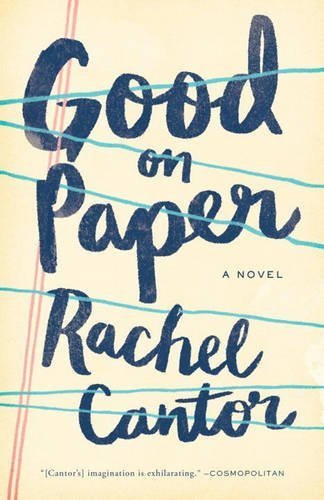What do you think?
Rate this book


Hardcover
First published January 26, 2016
Shira Greene is working as an office temp and living with her daughter, Andi, and Ahmad, her best friend, when she gets a life-changing telegram: Romei, the mysterious winner of the Nobel Prize for Literature, wants her to translate his latest, a work of poetry and prose based on Dante’s La Vita Nuova (literally “new life”), the same work that Shira was translating when she abandoned her Ph.D. At first, Shira thinks that someone is playing a joke, but she’s happy to have a second chance at her career; she even begins to imagine love with the eccentric part-time rabbi and owner of the neighborhood bookstore that publishes Gilgul, the literary journal where one of Rachel’s stories caught Romei’s eye. Cantor’s follow-up to 2014’s 'A Highly Unlikely Scenario' (which PW starred) starts light and shimmers with humorous touches, but as Romei’s faxed pages begin arriving, Shira panics, fearing the work is not only untranslatable but designed to break her. Translation is a metaphor through which Cantor uses her considerable powers with language to refract larger questions about family bonds, storytelling, and letting go of fantasies of new life and waking up to the life that is yours.Stevie Davies, in the UK Independent review, describes the character Shira as an irritating narrator, her verbal tics sashaying between airheaded whimsy and postmodern persiflage
Two weddings, he said, shaking his head, and I noticed he was dressed more formally than usual: black jacket, black tie, tzitzit swinging under a shiny black vest. Interfaith, he said. A beautiful thing, but the prep! First the Sufi girl and Reconstructionist boy in Central Park, then the Humanistic Jew, whatever that means, and the Christian Scientist …I found that exciting. A blended New York family, made up of friends, like in Lucky Us become the relayers of past events and future expectations.
In the library with Colonel Mustard?
The Masonic Temple on Amsterdam.
Poor sweetie! Have you eaten?
The names of Esther’s Midrash friends! Peshat, Remez, Drash, and Sod? Those are the four levels of biblical hermeneutics: the literal, allegorical, moral, and symbolic. There’s a Hebrew acrostic that refers to these four levels—Pardes, or Eden. He’s trying to help us understand how to read his work!Not only does the author embed Danté's imagery of feathers, flying, wings, and birds into her own characters, she also uses references from religious texts to enhance the story and her characters further:
I don’t think that’s it. Look, in “Confessions,” you compare yourself to Salomé, dancing to get the head of John the Baptist on a platter. Salomé is a cynical figure, love doesn’t figure into her story at all. The Shulamite, on the other hand, is innocent. Her love is erotic but pure. And reciprocated. Romei is asking you to re-vision your past, to see yourself not as Salomé but as the Shulamite. Reject the calculating, Salomé part of yourself, identify with that innocent part, the part that loves easily, that feels herself loved. You loved that boy in “Confessions,” right?The lecturing of the reader became really too obvious. Not good. Not good at all. Was it really a novel, or only a disguise to word-dumping?
Through events remarkable and unexpected, I have learned something of that story. I offer it to you here—the beginning, as I understand it; the middle, as I’ve lived it. The ending remains to be seen—I hope we can write it together.This was a daunting read, no pleasure to be found anywhere in the experience, since it requires some concentration. A knowledge of Dante's poems might also come in handy. I did not have it, but it nevertheless provided the substance to this dissertation-cum-literary-novel idea.
I’d made a vow when Andi was born: she’d be the center and the circumference of my life, its organizing principle and its limit. I would never abandon her, not in thought, word, or deed. I’d be everything my mother wasn’t.
The beauty of the sentences is the key. If in the very first pages I’m forced to read gratuitous phrases or banal metaphors, I won’t be able to get inside the story. Only if the sentences “sparkle” can I get hooked.